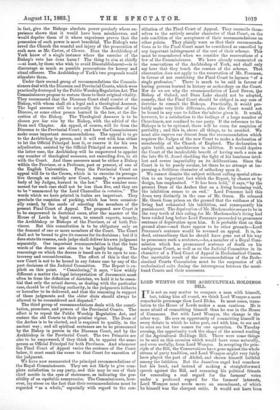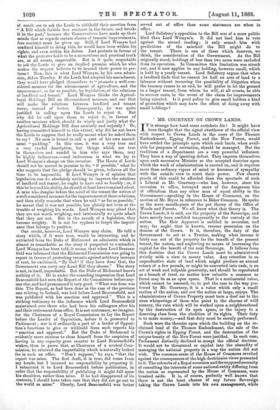LORD WEMYSS ON THE AGRICULTURAL HOLDINGS BILL.
IT is not an easy matter to compare a man with himself, but, taking him all round, we think Lord Wemyss a more remarkable personage than Lord Elcho. In most cases, trans- lation to the House of Lords makes a man cautious. He is more afraid of committing himself than he was in the House of Commons. But with Lord Wemyss, the change is the other way. He sees an opportunity of committing himself in every debate in which he takes part, and with him, to see and to seize are but two names for one operation. On Tuesday evening, the opportunity took the shape of the second reading of the Agricultural Holdings Bill. There were some things to be said on this occasion which would have come naturally, and even usefully, from Lord Wemyss. In accepting the prin- ciple of the Bill, the Conservatives have gone against the whole stream of party tradition, and Lord Wemyss might very fairly have played the part of Abdiel, and shown himself faithful among the faithless. But the dauntless angel had somehow lost his head, and instead of making a straightforward speech against the Bill, and censuring his political friends for concealing a real regard for the farmers' votes under a professed regard for the farmers' interest's, Lord Wemyss must needs move an amendment, of which he himself was the sharpest critic. It would not have been of much use to ask the Lords to withhold their sanction from "A Bill which forbids free contract in the future, and breaks it in the past," because the Conservatives have made up their
minds that as regards certain classes of tenants' improvements, free contract must be given up. Still, if Lord Wemyss had confined himself to doing this, he would have been within his rights, and even within his duties. Just protests in favour of what the protester holds to be a momentous and practical truth are, at all events, respectable. But is it quite respectable to ask the Lords to give an implied promise which he who makes the request believes to be beyond their power to per- form Now, this is what Lord Wemyss, by his own admis- sion, did on Tuesday. If the Lords had adopted his amendment, they would have pledged themselves to " promote a well-con- sidered measure for the advancement of agriculture, and the improvement, so far as possible, by legislation, of the relations of landlord and tenant." Lord Wemyss thinks the Agricul- tural Holdings Bill an ill-considered measure, and one that will make the relations between landlord and tenant worse, instead of better. Consequently, he was quite
justified in calling upon the Lords to reject it. But why did lie call upon them to reject it, in favour of another measure which should do wisely and justly what the Agricultural Holdings Bill does unwisely and unjustly I Or, having committed himself to this extent, why did he not leave the Lords to suppose that he really meant what he asked them to say ? No man is bound to call a part of his own amend- ment " padding." In this case, it was a very true and a very candid description, but things which are true in themselves and candid in him who says them, may be highly indecorous,—and indecorum is what we lay to Lord Wemyss's charge on this occasion. The House of Lords should not be moved to promise to do, " if possible," what he who suggests that the pledge should be given, believes all the time to be impossible. If Lord Wemyss is of opinion that legislation can do absolutely nothing to improve the relations of landlord and tenant, he ought to have said so frankly ; or, if this be beyond his ability, he should at least have remained silent. A man who dangles before the mind of the tenant the notion of a well-considered measure for the improvement of these relations, and then airily remarks that when he said " as far as possible," he meant that it was not possible, has plainly not been at the trouble of weighing his words. Lord Wemyss may plead that they are not worth weighing, and intrinsically we quite admit that they are not. But in the mouth of a legislator, they become weighty. It is not for cyphers to forget the import- ance that belongs to position. One credit, however, Lord Wemyss may claim. He told a story which, if it were true, would be interesting, and he extracted from the Duke of Richmond an admission which is almost as remarkable as the story it purported to contradict. Lord Wemyss has been told, it seems, that when Lord Beacons- field was informed that the Richmond Commission was going to report in favour of protecting tenants against arbitrary increase of rent, he exclaimed, " By God l if they have done that, the Government can carry any Land Bill they choose." The story is not, in itself, improbable. But the Duke of Richmond knows nothing of it. He is under the consoling impression that Lord Beaconsfield had seen the Report of the Commission before any- one else, and had pronounced it very good. " What was done was this. The Report, as had been done in the case of the previous one relating to Ireland, was laid before Lord Beaconsfield, and was published with his sanction and approval." This is a striking testimony to the influence which Lord Beaconsfield maintained over those who had been his colleagues after his and their retirement from office. It is not customary, we imagine, for the Chairman of a Royal Commission to lay the Report before the Leader of Opposition, before it is presented to Parliament ; nor is it ordinarily a part of a leader of Opposi- tion's functions to give or withhold from such reports his " sanction and approval." But the Duke of Richmond is evidently more anxious to clear himself from the suspicion of having in any capacity gone counter to Lord Beaconsfield's wishes, than to prove that, as Chairman of a neutral Com- mission, he retained the impartiality which is naturally looked for in such an office. "Don't suppose," he says, "that the report was mine. The first draft, it is true, did come from my hands, but I incurred no responsibility by preparing it. I submitted it to Lord Beaconsfield before publication, in order that the responsibility of publishing it might fall upon his shoulders, rather than mine. If he had disapproved of its contents, I should have taken care that they did not go out to the world as mine." Clearly, Lord Beaconsfield was better served out of office than some statesmen are when in office.
Lord Salisbury's opposition to the Bill was of a more politic kind than Lord Wemyss's. It did not lead him to vote against the second reading ; it only armed• him with predictions of the mischief the Bill might do to the tenant. There is one of these which deserves, we think, the consideration of the Government. As the Bill originally stood, holdings of less than two acres were excluded from its operation. In Committee this limitation was struck out, and it now applies to any holding, however small, which is held by a yearly tenant. Lord Salisbury argues that when a landlord finds that he cannot let half an acre of land to a labourer without incurring the possibility of litigation when the tenancy comes to an end, he will prefer to let the ground to a larger tenant, from whom he will, at all events, be able to recover costs, in the event of the claim for improvements being rejected. Is it good policy to give small holders a kind of protection which may have the effect of doing away with small holdings ?



































 Previous page
Previous page